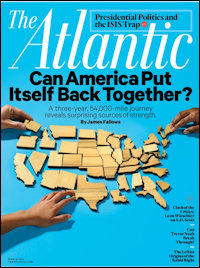Seventy-two percent of Americans think the United States is headed in the “wrong direction,” according to a recent AP-Gfk poll, and most of those discontents attribute their sentiment to the dysfunction of American politics. That’s no surprise given the gridlock that has beset Washington, D.C. — gridlock resulting from the polarization of the American electorate between an evenly matched “red” America and “blue” America in a constitutional system designed to thwart radical change based on slim majorities.
James Fallows, a national correspondent for the Atlantic Monthly, is nostalgic for the days when an visionary effort could galvanize the country behind a national goal. But he is clear-eyed enough to see that the political will does not exist to address, to pick an example he cares about, the inequality of wealth and power in America’s second “Gilded Age.” What ever does a social reformer solver do?
After three years of criss-crossing the country in a single-engine plane, an aerial “Travels with Charlie,” so to speak, Fallows has discovered that the national funk is less pronounced in America’s states and metropolitan regions. Indeed, working at the community level, people are finding ways to solve problems and get things done. Apparently, the old “laboratory of democracy” is alive and well, with thousands of experiments occurring across the country. Communities rich and poor, red and blue, are reinventing themselves. “Many people are discouraged about America,” he writes in the current edition of Atlantic Monthly. “But the closer they are to the action at home, the better they like what they see.”
Fallows quotes University of Virginia professor Philip Zelikow, director of the Rework America initiative, as saying: “In scores of ways, Americans are figuring out how to take advantage of the opportunities of this era, often through bypassing or ignoring the dismal national conversation. There are a lot of more positive narratives out there — but they’re lonely, and disconnected. It would make a difference to join them together, as a chorus that has a melody.”
Ordinary Americans have lost faith that they can make a difference in a Washington, D.C., ruled by special interests, entrenched bureaucracies, lobbyists and political action committees. But they feel they can make a difference in their own states and communities. Thus, according to a Mary Washington University-sponsored poll taken in November 2015, while 58% of Virginians responded that the nation was going in the wrong direction, only 43% felt that the state is heading the wrong way. I don’t know if anyone has asked that question at the metropolitan regional level, but I suspect that, here in Virginia at least, the wrong-way sentiment would be even lower. Speaking personally, I believe that my home metro of Richmond, despite many warts and blemishes, is very definitely moving in the right direction.
Fallows sounds a rarely heard tone of optimism. Among his observations:
A talent dispersal is underway. The “big sort” is short-hand for the tendency of the most highly educated, creative, productive and entrepreneurial people to migrate to the nation’s largest talent magnets like New York, San Francisco, Seattle or Washington, D.C., draining the rest of America of energy and talent. While that phenomenon is real, there is a counter-migration, Fallows asserts. “We were surprised by evidence of a different flow: of people with first-rate talents and ambitions who decided that someplace other than the biggest cities offered the best overall opportunities.
An archipelago of creativity. Not every computer programmer with big dreams wants to move to Silicon Valley. Enough prefer to live in less expensive, family-friendly cities that technology companies can take root elsewhere. Writes Fallows: “American thinks of itself as having a few distinct islands of creativity; I now see it as an archipelago of start-ups and reinventions.”
Even “hopeless” places are reinventing themselves. Fallows highlights the forlorn communities of San Bernardino, Calif., and northeastern Mississippi as places that have hit bottom and are clawing their way back. “If you wanted a vista of American hopelessness, you might think to start in Mississippi,” he writes. “But here again, we heard that through the country as a whole was in trouble, things are home were moving in the right direction.
The assimilation engine moves forward. While national politics focuses on illegal immigrants and Muslim terrorists, those just aren’t pressing issues at a local level. “Red” America may have the reputation as inhabited by racists, know-nothings and bigots, but Fallows was struck by how inclusive many communities are. “The anti-immigrant passion that has inflamed this election cycle was not something that most people expressed in most of the cities we visited,” he says. “Politicians, educators, businesspeople, students, and retirees frequently stressed the ways their communities were trying to attract and include new people.”
The arts revolution is transforming small cities. Art isn’t just for big, wealthy cities anymore. Fallows finds extraordinary energy poured into local arts in communities across the country.
So, where do we go with this? Washington gridlock is probably with us for a long time. I see little indication in the polls either of an electoral revolution that will give either party a lock on all three branches of the federal government, or a readiness of either Republicans or Democrats to sacrifice core principles on the size and scope of government. Any action that occurs will take place at the state and metropolitan levels.
I’ve been corresponding recently with an old Bacon’s Rebellion contributor, E M Risse, who has long argued that what he calls New Urban Regions (roughly conterminous with Metropolitan Statistical Areas) are the fundamental units of economic competition and development in the global economy. The problem, he argues, is that governance structures in the United States have not evolved in sync with the underlying economic reality. He and I used to explore this issue in depth when he was active on the blog. Perhaps it’s time to revive that discussion.



